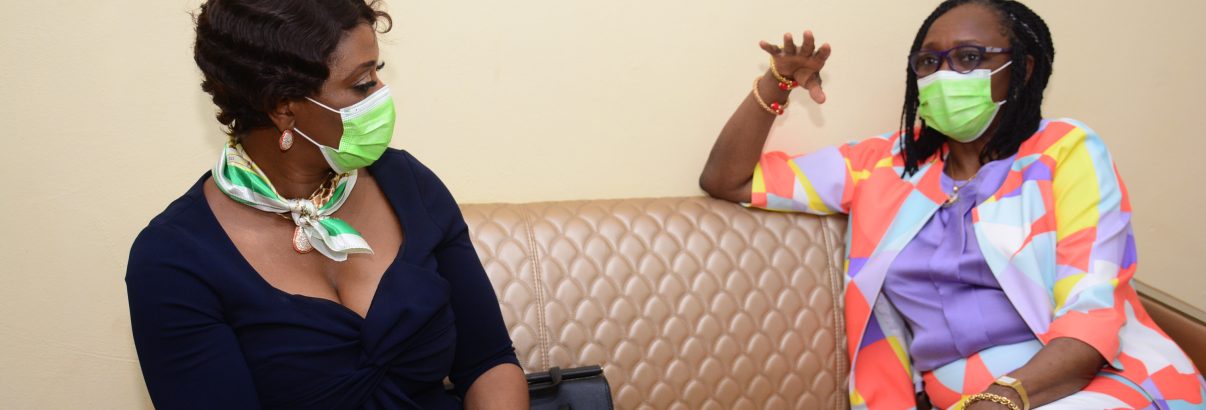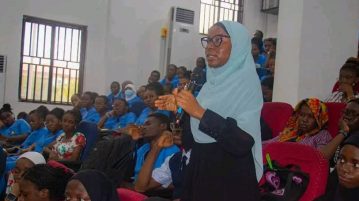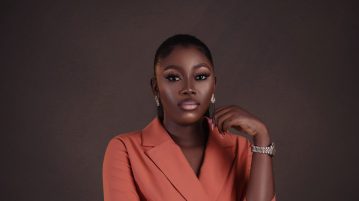Celebrating Amazons in Medicine, the MWAN Lagos Editorial team and Medical Mirror correspondent visited Professor Folasade T. Ogunsola (fondly called Prof. F.T.O.) at her new office at the Academic Publishing Centre, University of Lagos, after she completed her 4-year tenure as the first Deputy Vice Chancellor (Development Services) of the University. In this interview, she shares her journey in the medical, political and academic field. Below are excerpts from her interview.
Correspondents: Dr. Yetunde Ayo-Oyalowo, Dr. Omolara Odunsi, Dr. Ire Adeleye, Dr. Mary Agoyi-Awoniyi and Ms. Chisom
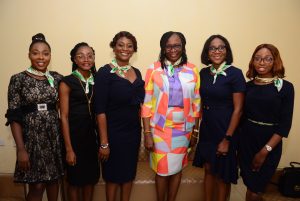
Q: Tell us about yourself ma.
Prof. F. T. O.: I started off my life as a really shy person. I always sort of pulled back from a lot of things not because I didn’t want to do them but because I was shy, even till university. There are so many examples I can give. One example I remember was when I was in form three in Queen’s College, about 13 or 14 and I sang soprano. I remember singing Handel’s Messiah: Rejoice, and my principal – Mrs. Coker – told my parents that I should go abroad for voice training. I refused, not because I didn’t want to go but because I couldn’t imagine being among strangers and having to talk to people I did not know. I look back and I wish I had gone. I did continue to sing but I never got professional training. I remember when I was supposed to go to an event at school; there was a ballot which I won it but gave to somebody because I was frightened of not knowing what to say. I always had stage fright, and was very sensitive; everything was a major sensitive issue, and I just thought, “Is this life?” I decided I was going to have to change and started searching for solutions then I read some books, and decided to start pushing my own boundaries and trying, not just giving up out of fear. I remember there was a book – “There’s Value in the Valley”. One thing (out of the many lessons in the book) that stuck in my head was “nobody is after you”. People are going about their day; they’re not even noticing you. So, I started that journey to overcome some of my own limitations that were self-imposed. I decided that I was going to try even if I was scared stiff. And so, I started coming out of my shell. It’s been a long journey learning to move past my limitations. Some of my mantras were, “If others can do it, so can you”, “It’s okay to fail”, “No one is perfect”. So, now when I say, I was shy, people say, “you ke?” I mean, I’m still not very outgoing. I’m not outgoing like Dr. Oyalowo (chuckles).
Q: Please, tell us about your education, trainings and journey in the academia.
Prof. F. T. O.: I did my residency at UNILAG. In 1989, I came in for a Masters in microbiology. Getting to microbiology was a totally different story. I had actually gotten admission for paediatrics… you know, when you go to medical school, it’s usually major specialties like paediatrics, O & G etc. I never saw microbiology as a specialty. Also, I was taught by people who were not medically qualified so microbiology was ‘boring’. In fact, I hated it. After my youth corps, I got very fascinated with HIV, then my brother-in-law who was a clinical microbiologist – very knowledgeable and very clinically oriented – showed me a side of microbiology I had never seen, convinced me to come into medical microbiology. At the time he left for Saudi Arabia, he got me into a PhD program in the UK. Now, at the time I was going for the PhD, I had a four-month old baby and everybody said “o ma gbomo e le? o ma foko e le?”, (interpreted as – “you will drop your child? you will leave your husband?”). Those were the sort of statements used to hold women down. Statements like, “he’d have gone before you come back” and all those kinds of advice. And I remember saying, “if he’ll go because I went to England then he’s going to go before we’re old”, I mean, there will be other reasons to go so you move on and he was supportive. I also had a mother who was a professional, who had traveled and came back, and was on my side. My mother said, “Please go. Your baby just needs warmth, food, hugs and love, and that he will get. If you wait till he’s three, or older, he would have known you and then, he will have some separation anxiety”. And truly, I went, came back, and my child was a very happy baby who did not too miss me at all. I had some fantastic people who took care of him, and when I came back, within a day, we were friends. We were back to normal as if nothing happened. I used to call and sing to him while I was away. So when I arrived, and I started singing our songs, he came and held me and that was it. No separation anxiety or anything of the sort. I then realized that what was important was the quality of the time spent. You need to know what people need at the time they need it. These are some of the lessons I learned from that period.
I came back, started my residency and will share somethings I learned that I sort of found to be useful. My residency period was very interesting. I came to recognize that microbiology was very clinical and not just academic, and I got very involved in the clinical aspect. When I went to the UK, I was in the medical microbiology department and I could see that they went for rounds regularly amongst other clinical activities, and I got to appreciate the clinical microbiology even more. I learned one life-changing lesson when I came back and it was this: It is in service to others that you get elevated or you achieve your dreams.
As a young lecturer, for almost one year I couldn’t do any research – no money, no equipment – and I was slowly coming to the decision to leave academia. One day, I decided that I had to do something. So, I asked my HOD for broken-down equipment which I repaired with my money. You can have two streams of thoughts about my decision. You either think, “Why are you using your money to repair university equipment”, or you can think, “Are you ready to spend some money to invest in your own life?” After all, if I write the research, it’s not the government’s research paper. If I’m sitting here for one year, it’s my time that is wasting not the governments’. The government is a circumstance. So, what am I going to do in my circumstance to make sure that I move ahead? I decided to do two things: I got the machines repaired and I started a seminar for residents. I was a “Lecturer I” and it became very popular. It was from there that a resident called me one day from General Hospital, he said, “I gave your name to a group of people who called me from Harvard, asking for a Clinical microbiologist, I hope you don’t mind?”. Now, if I had not started that seminar series, why would he call me, a Lecturer I, youngest lecturer in the whole department, when there were professors there? I wouldn’t have been the one, but because I was interacting with them and he felt I had added value to their lives, I was the name that came to his mind, and that saved me from leaving academia, because from there I started a journey into research that I haven’t looked back from. I then got involved with Harvard. They took us to Senegal, we had training, and I wrote my first research grant to them for an award, which I got. When I was writing it, I didn’t tell anybody, even in my department because I didn’t expect to get it. I was writing it at night. Everywhere I went, I carried it to show a few people. Now, when you’re working towards achieving a goal, you are bound to meet people. While I was waiting, I started to work on what I knew we should be doing. I got involved with paediatrics, giving them advice on antibiotic use for their patients, especially children on antibiotic combination for difficult cases and soon was being consulted regularly by the paediatricians. When they got a research grant, I was invited and was sent to the Medical Research Centre in the Gambia for training, I took my little proposal along with me. On getting there, I was introduced to a British professor to whom I shared my proposal. He made some suggestions which I incorporated. He further advised that I saw someone in Community health which I did. By the time I was done, I had a robust proposal. All this brings me back to service, because none of this would have happened if I had just sat in my corner lamenting about the government. Now, I’m not saying that I did it because I was so ambitious; I just thought that if I was going to be here, I better do something useful with my time. And because of all the great things happening, I was being pushed up. Once I started that journey, it struck me that you don’t wait for people to invest in you, you invest in yourself.
If you don’t think you’re valuable enough to take yourself to a conference with your salary, why should someone else invest in you? We sometimes think that the valuable things are the tangible assets when in fact, it is the intangible things—your knowledge and skills which are the outcome of your personal self-investments—that are important. You’re not valuable in a “knowledge economy” without knowledge, therefore it is important to put a premium on getting knowledge. Anywhere you go, whatever you participate in adds to your knowledge. Don’t get into seeing money as the only benefit to being involved in project, think of the experience and the skills that you are getting; it is worth more than money because they are investing in your knowledge base.
One of the things I got to appreciate in my journey of getting my PhD was knowledge acquisition. I got to appreciate critical thinking—grasping information in a foundational way, and moving forward with that information into implementation… by yourself. Another thing was learning to create my own environment. We all work in a very disabling environment, but I realized that it was my choice to become disabled by my environment or to rise above it. I could either complain or I could get up and move. Also having a parents who had a “nothing-is-impossible” attitude helped. They would always say in the face of difficulty that “there is always a way!”. Growing up in that kind of home meant that you always thought your way around any difficulty because there was always a way.
At this point, I have to mention Prof. Bunmi Rotimi and Prof. Tolu Odugbemi – they both sat on my neck, figuratively. At the time, I had completed my PhD and national fellowship and started working, I decided that was a good place to stop but Prof. Odugbemi said, “o o ni se West Africa?” (interpreted as – won’t you do West Africa exams?) So, he pressured me till I collected my form and did not let me rest till I submitted it. I was the last person to pass in my forms because I decided that it was better to pass the forms than to face Prof. every morning. That’s how I got both fellowships. I would have loved to say that I was a fantastic student who did these things with love but NOOO! (chuckles) It was because of good mentorship—mentors who would push you when you were weak and who expected greatness from you. At the time I had my fellowships, I also began to get grants. That was when I did my Kuramo Project work (HIV in Lagos Slum amongst Commercial sex workers), and other grants came from there. I take many grants (big or small) as long as they help to drive my vision. Some grants you may get some honorarium for your time, others you don’t, but it doesn’t matter whether you’re paid money or not because you always benefit in the knowledge area. You must be careful not to get overly invested in money, if you accept to do the work, do your best. You can’t start something and underperform because “owo yen o to” (interpreted as – “the money isn’t enough”). Why then did you accept it? Once you’ve accepted a job, please do it well. You are building bridges and you don’t know where it’s going to take you. My attitude is always that there is more to every job than money; it is about networking, about the bridges and relationships that you build, the people that you meet. Truly, these intangibles have moved me further along than any other thing.
Q: Wow, very insightful. So, how did you become the provost?
Prof. F. T. O.: All of the projects that I got to do helped, but I think what got me into becoming the provost (and what gets you anything in life really) was service; things like this usually come from what you are doing for others, not what you are doing for yourself. When I finished my projects, I could have chosen to sell the equipment but I looked around and thought, “College doesn’t have these things”, so I took some for my own office and sent the others out—to my department, LUTH, Administration department—essentially, furnishing those places with the equipment. We had a generator and I asked that it be wired to the departmental lab (I included my office, of course) so that whenever there was no electricity we could still run our laboratory. I believe that you cannot be bigger than where you work or live etc. If it is a good place, you will also benefit from it. For example, if someone says they’re from Harvard, you automatically assume they’re smart whether they are daft or not. If, however, someone says there are from “Igbo-elerin University”, you assume they’re daft until they prove themselves. When you come from an environment that’s not okay, you find that you’re always constantly proving yourself but if you can make it okay, you market it. That’s why I’m very upset when things go wrong and we say “Nigeria!”. How do we just de-market our country? We can never be greater than Nigeria. Nigeria has her problems but she also has a lot of good things. America has her problems but if we were Americans, we would have called ourselves a nation of mass murderers and mass shootings. I’ve never heard an American say Americans are mad. You will more likely hear, “a mad man shot people”. Here, however, we just say, “all of us” or “Nigerians!”, and I think it’s totally demarketing. If you as a Nigerian tell the world that we’re useless, do you think you are above what you’ve just said? You’re classified with them. And so, I would rather localize the problem. Saying “we have corrupt politicians”, is different from “Nigerians are corrupt”. We have great doctors, nurses, people from different walks of life. Are they all corrupt? Anyway, that’s a different discussion but I’ve always had that belief that you’re not greater than where you’re from, so invest in where you are because you are seen in the light of where you’re coming from. That has always been, and still is my attitude to the College. We do have challenges but it is you and I that will fix them. Funny thing is, at the time, I didn’t even realise that I was doing something special. When I was told that, “you should be provost”, I said, “what have I done?”. I’m not a very political person and certainly did not have provostship in my radar however with the benefit of hindsight, I can see why I was pressured by some to assume the office. They kept saying that I had done things for the college. I did not know at the time that it was anything because they were aligned to my core values which I had not articulated were expressed in my decisions and actions.
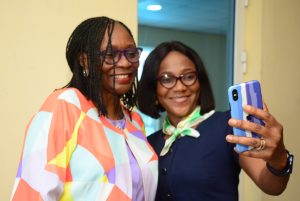
Q: Could you share your greatest challenge in your journey into becoming the provost?
Prof. F. T. O.: The greatest challenge was going out to campaign. It really was the most difficult thing I’ve ever done in my life. A lot of the people whom I had assumed (due to their statements) would help me in campaigning were nowhere to be found. I learned that if you don’t do it yourself, nobody will do it for you. I also had to do it my way. It was difficult for me to go to an office to “sell” myself, so I decided that I would start with a text message informing them of my intention to visit them, which served as an introduction before I showed up. As provost, I decided I will just be myself. The position was not going to change my interaction with people. There were things you must come to terms with, those who will like you will like you, those who will hate you will hate you. You also must come to terms with, when in a leadership position you will be fairly and unfairly criticised, and false stories will be circulated about you that you often don’t hear. Now, I love being a woman, and I truly believe that a woman is capable of bringing fresh perspectives and ideas. However, as the first female provost, I realized that there would also be some challenges in that regard. But I had decided that I wasn’t going to change who I was. I’d probably still have some ‘haters’ even if I changed, so I might as well be comfortable in my own skin—remain true to who I am. Another thing was to ensure that you follow the rules. Once you break the rule for anyone it becomes a slippery slope because that instance will always be referred to. Everything is easier when you follow the rules. And if I do bend the rules, it’s not based on a person but on a principle that can be applied across board.
Q: It’s amazing to see that you did all you did without knowing that provostship was in view… so how did the Deputy Vice Chancellor – Development Services (DVC DS) position come into view?
Prof. F. T. O.: It wasn’t in my view at all. In fact, I had been approached by different people two years before I finally made my decision to be the provost. And that decision came as a result of a thought that crossed my mind which was, “It’s a man’s job.” I am a feminine activist so I examined the thought, wondering why I was thinking this way. I mean, I was raised in a very gender-equal family. I realized that somehow the patrilineal society had crept into my subconscious creating limitations in my mind, that I was not even aware of. That was the day I decided to try but for all big decisions I speak to God. I said, “Father, if this is not Your will, scatter it! I will get over it”. This is a prayer that I’ve always prayed for myself, my husband, my work… everything. My part is to do my best, the outcome is in God’s hands. That way, if it doesn’t work out, I’ll know that I did everything I could, but it was not His will. I also made up my mind to be me, it is even easier. There were times I wondered if I wasn’t bringing down the “reputation of the office” with my being jovial and friendly. However, I gave up after a while and just was myself. Then I became Deputy Vice Chancellor (DVC), that was something I had not planned at all. I didn’t even campaign for the position; I was voted in by people. In fact, I had planned to do only four years in office and that would be it. Then I became acting Vice Chancellor (VC) for three months. That was another ‘shocker’ but I saw it as a temporary position. I mean, those were rough times, with all that saga and stories in the newspapers etc.
Q: What did you struggle with?
Prof. F. T. O.: I currently am a fellow of the Royal College of Pathologists by publication. This was something that I was supposed to have applied for about 5 years ago. The point is that I procrastinate, but I realized that whenever I procrastinate, it is because I am not sure or confident of the content. Even though I had gotten a review from one of my mentors and he had confirmed that my papers were good, I did not agree with him… (chuckles). When I eventually submitted the papers at the time I felt comfortable submitting, I got the fellowship. One day, I read a book about women, which I recommend for everyone: The Confidence Code. In the book, I got to understand that women usually wait till they are 150% certain before taking action while men take action at 30%. They don’t wait endlessly, they just do. And here’s the challenge: overthinking things, waiting until all the I’s are dotted and t’s are crossed. That’s something I’m currently working on. Now, I just jump in. Once I’m 60% sure, I do it. I ask myself, “what’s the worst thing that could happen? I’ll fail? Who doesn’t fail?” I have this discussion with myself. I mean, no one likes to fail but there is no win without failure. I still do my due diligence but once I see myself getting to that point where I want to be 150% certain, I tell myself, “Sade, ko le de 150, let it go” (interpreted as – Sade, it cannot get to 150%, let it go). Funny thing is, the work gets reviewed and I hear wonderful reviews while all I can see are the errors. So, I’m getting to accept that things won’t be perfect and to do my best, run with 60% not waiting for 150%. It’s a book that liberated me and one I always recommend.
Q: How do you motivate your team members, and handle conflict and dispute among them?
Prof. F. T. O.: Working with teams is inevitable. I have always, and still work with teams. I think one important thing is ensuring that everyone on the team understands and buys into the vision. Arguments are inevitable but as long as they’re not because of personality differences, and everyone is striving towards the same vision, you will eventually get over the problems. You must also understand team building. It will take time to find your ideal team. Not everyone can work together. Once you come to terms with that, you won’t be hurt when people begin to drop out of the team. However, those that remain will work together better towards the actualization of the vision.
Most importantly is for you to look out for your people and be ready to take responsibility. Know that you’re responsible for your team. I can confidently tell you that the reason I could be DVC and Provost without my projects suffering was because I had great people working with me. Don’t always be eager to be the one that everyone must see. Understand the strengths of each member of the team and deploy them in the area of their strengths. Appreciate your team’s strengths and give everyone a chance to shine. Let every member of the team feel like they have a stake in each project. I currently have two ongoing projects that people don’t even know that I’m the Principal Investigator (PI). I meet with the team when necessary and they move forward. You must be comfortable with not being the one in the limelight. Learn to listen and give credit as and at when due. Allow people to use their initiative while making sure that everyone understands the overall vision and knows the direction that the team is going. You’d be surprised how great the diversity can be in actualizing the fundamental vision. Be ready to fail as a team and start over. However, ensure that your team is filled with competent people. Play to each person’s strengths so that they’re not being set up for failure. I am not a micro-manager, I give people responsibilities and let them achieve the result within the agreed framework. If I start to micromanage you, it means I am losing confidence in your ability to deliver and its always a feature of my anxiety.
Conflict resolution is important but you’ll find that you won’t have much conflict when everyone is focused on the job. Again, as team-lead, you must know when to let people go, so that the entire team is not destroyed. I’ve had to let some people go from the team because no matter what you do, all they bring is bad vibes. You must also know yourself, because it is in knowing yourself that you know who complements you, your weaknesses etc., and save yourself from personality clashes. As you get to meet people, you get to know more about yourself. It’s also important to always be ready to apologise. I have learnt that what you consider inconsequential may be a trigger to someone else. Therefore, it is important to identify the part you may have contributed, no matter how unimportant you think it is. A wound is a wound, no matter how small you think it is. Therefore, always be ready to apologize.
Q: Thank you so much ma. It is evident that you have excelled in areas that have been zoned for only men and of course, for women. We would like to know your mentors and role models. Also, are there any professional women that have inspired you?
Prof. F. T. O.: Quite a number. The first, and this is not because everybody says it, is my mother. My mother is a judge. When Western Nigeria was divided up, she moved to Ogun state from Ibadan and I think she was the first female high court judge there. She had to travel almost daily to Ogun state till she got a house there and came home only at weekends. She’s one strong woman, you know. I mean, I have so many things she told me that I have kept to heart. One of them I hold dearly is, “always live within your means” – know your limits and don’t go beyond them. I’m different from her in that I was a very sensitive child and she is practical, and thank God for her because it helped to toughen me.
Another person is Prof. Akinsete. I love how brilliant, yet simple she is. She looks so young, and she talks to everyone with respect. You would actually think she’s your age mate and she never pulls rank. I got to study her from afar initially, then more closely when I got to consult for Pathcare. At the time, she was the director, and one of the directors of the AIDS Intervention Initiative. She was just someone who was so excellent and yet, so down to earth. Another person is Prof. Olurin in Ibadan, an ophthalmologist. Her simplicity also drew me to her. These were women who had achieved monumental feats and did not “carry it on their heads”. I found them intriguing.
I also had male mentors. Prof. Rotimi really provided a shoulder for me to stand on and pushed me. Prof. Odugbemi came in later, and helped to propel me as well, but Professor Rotimi got me into Microbiology. I might even say “forced” me, because it was a battle to do a PhD. He was the one that encouraged, pushed, pulled, even tugged until I got into the right direction, and going abroad for my PhD was one of the best things to happen to me. It wasn’t only about the PhD but also about the exposure to a different work environment and way of doing things which was really good for me.
Q: Wow… thank you so much ma for these amazing insights. We would like to talk to you about the COVID pandemic. You seem to have been more vocal during the Ebola period (I did attend one of your trainings) and more silent and in the background during this COVID pandemic. We would appreciate your thoughts on the way the country has handled the pandemic.
Prof. F. T. O.: I think the country has done well but we can definitely do much better. When compared to others, our response time was not bad. However, when compared with the best, it definitely could be improved upon. Then again, it’s easy to find things that we could have done better. It’s also not easy for the federal government to have a cohesive approach because of the individuality of the states. There are states in Nigeria who believe that there’s no COVID and therefore have no measures in place to mitigate the pandemic, thus pulling others back. That being said, an optimal and adequate response to epidemics will always involve continuous investment in our healthcare system which was not the case with us, thus we cannot not have a consistent, efficient response at all times. The response was however good enough, considering the abysmally poor state of the healthcare system on all fronts. Now, I haven’t been silent. I have been working, I just haven’t been out there. I’ve been in the Lagos state think-tank. I work with the African CDC on their guidelines committee and the training working group for COVID. I’ve been giving lots of training sessions and seminars within Lagos state and across Africa, especially in the area of infection control to help reduce infection transmission and reduce Healthcare worker infection. I suppose that my work this time around has been more around training, developing policies and strategizing as opposed to my usual foot-on-the-ground work.
So, as a nation, we have done quite well but there’s still a lot more to be done because there are going to be many waves. One problem in Nigeria is that we tend to handle the emergency situations relatively well but lack the capacity to sustain and maintain the momentum. It’s important to ensure that politics does not take over the focus from the nation.
Then, there’s the issue of vaccines. I believe that it is our responsibility as professional women to be scientific in our approach, and to intentionally squelch wrongful information circulating online about the vaccines. We must understand that there is no magic anywhere; science is science. We need to study and speak out more. If due to misinformation, doctors and nurses are afraid of getting the vaccines, how do we hope to convince the general populace? We must ensure that all the wrong information being shared on the internet ends with us. But all in all, we responded quite early and well. The challenge is in maintaining what has been started. Unfortunately, this will be challenging because we’ve lost our fear of COVID and everybody has gone back to “normal”. This is dangerous because too few people are vaccinated, so the virus is still circulating which will promote mutations and new variants. My advice is to keep pushing the vaccination message.
Q: Thank you ma for graciously answering our questions. We’d like to go a bit more personal. What’s your favourite vacation spot?
Prof. F. T. O.: Wow, do I have? I think my current favourite vacation spot is Texas, USA. Why, you may ask? I think it has to do with my family being there. It is a quiet, lovely suburb with not so many people there. I feel quite peaceful whenever I’m there. However, if you ask me what I would love to do, it would involve lots of visits around places with clear water; to wake up to crisp air with nature all around me, to be able to sit and read a book in peace. I think the running thread here is peace. My life is usually full, so anything that brings me peace and calmness will be a great vacation spot for me.
Q: I’m sure people would have told you that you have a sporty physique or assume that you play volleyball or any other kind of sport. Do you engage in any sporting activities?
Prof. F. T. O.: Never! (chuckles) I’m a couch potato who struggles to do sports. I mean, if there’s one thing I have a million excuses not to do, it’s exercise. I remind myself of its importance, then I pay money and that money wastes. I eventually got a personal trainer and I warned him. I said “mo bad gaan o, any excuse ti mo ni, don’t listen to me, anything I say don’t even agree, just be tough” (interpreted as – “I am very bad oo; any excuse that I have, don’t listen to it, anything I say, don’t even agree, just be tough”). I have gone through many trainers! I have not found one who will take no nonsense from me yet! So still searching…
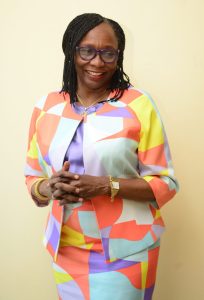
About Prof. F. T. O.:
PROF. FOLASADE TOLULOPE OGUNSOLA – Consultant and Professor of Clinical Microbiology – is a medical graduate from the University of Ife, who became the first female provost of the College of Medicine, University of Lagos and subsequently, the first Deputy Vice Chancellor (Development Services) and first female acting Vice Chancellor of the University of Lagos. Having achieved great feats in the academia, global infectious disease sector, she is currently the Chairman, Academic Publishing Centre, University of Lagos and Director, Centre for Infection Control and Patient safety among other positions she holds globally.

